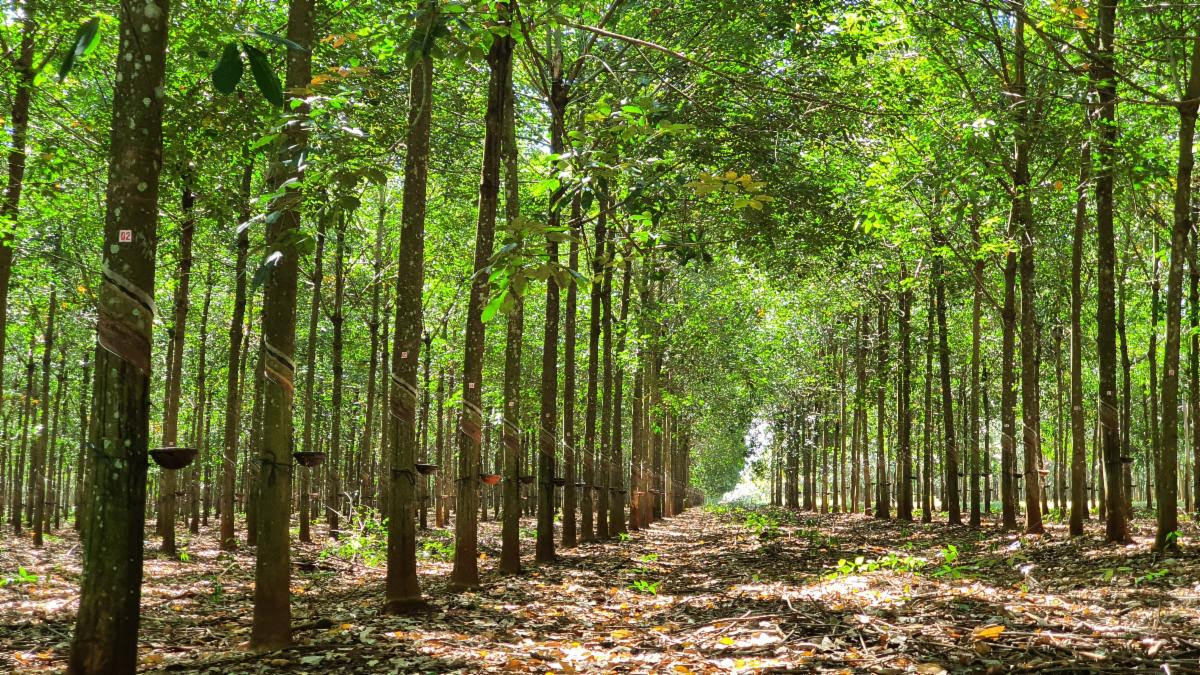
Rubber plantation in Vietnam. The Vietnam Forest Certification Office (VFCO) is the first national member to supply PEFC-certified natural rubber and rubberwood. (Photo credit: Dr Tran Lam Dong)
How to make sure the natural rubber
sustainable supply chain is fair and inclusive:
Managing the Social Risks for
Six Million Farmers
Climate resilient growth for natural rubber production depends on how well hard risks and soft risks are managed, PEFC’s CEO Ben Gunneberg said in the online panel discussion organised by the International Rubber Study Group earlier this month (March).
He pointed out that as 85% of natural rubber is produced by six million farmers – mostly in the Southeast Asian countries of Thailand, Vietnam, Indonesia and Malaysia - there’s a need to have partnerships in place to meet Sustainable Development Goals (SDGs) and to foster a sustainable raw material supply chain.
“Risks to Economic Activity in 2021: Implications for Future Growth and Sustainability” was the title of the global natural rubber industry event.
A sustainable approach to natural rubber production demands that we take account of all the hard risks, which Mr Gunneberg identified as relevant legal rights and land ownership, as well as human rights and labour issues.
Recognising the rights of indigenous people and as well as communities that are dependent on rubber, are equally important, he said.
No less important are what he describes as the soft risks: socio-economic and market conditions, including gender inclusion, practical issues like clean water and sanitation, as well as vital access to health and education services.
To mitigate and manage these social risks, PEFC is applying its Sustainable Forest Management (SFM) Group certification approach, which it has been making available for smallholders in the forestry sector for the past 20 years.
He also explained how PEFC’s Chain of Custody certification process can also be called on by all those in the natural rubber supply chain to provide independently verified assurance to end users that the rubber materials or products come from well-managed certified plantations.
Mr Gunneberg also called for the application of SDG 17, as Partnerships are crucial in the natural rubber production and supply chain. He saw four categories where partnerships were essential to develop:
· Company led procurement policies
· Local capacity and infrastructure building
· Public policies to enable legal frameworks
· Transformation of production to improve yield and quality, as well as living incomes.
He drew special attention to Vietnam as it provides a relevant case study where smallholders feature in the Sustainable Forest Management (SFM) process.
“The Vietnam Forest Certification Office (VFCO) is the latest member to achieve PEFC endorsement of its national forest certification system,” Mr Gunneberg pointed out. “It’s also the first national member to supply PEFC-certified natural rubber and rubberwood."
In 2020, Vietnam produced 16,000 tons of certified natural rubber from its 11,300 hectare plantation. In 2021 that will increase to 61,000 tons of natural rubber coming from another 60,000 hectares which have been certified. Vietnam will also produce 300,000 cubic metres of rubberwood this year.
To see and hear a full recording of the online panel discussion organised by the International Rubber Study Group, go to:
For more on PEFC and Vietnam, go here: https://www.pefc.org/news/



